

Data Mining to Recruit Sick People.
Private lives. Our personal details are used everywhere.
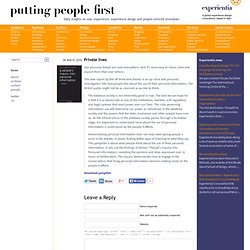
And it’s more easy to share, mine and exploit them than ever before. This new report by the UK think tank Demos is an up-close and personal investigation into how people feel about the use of their personal information. The British public might not be as reserved as we like to think. The database society is not inherently good or bad. The best we can hope for is that it is as democratic as any of the institutions, markets, and regulatory and legal systems that exert power over our lives.
Download pamphlet. Overview. Overview The Tor network is a group of volunteer-operated servers that allows people to improve their privacy and security on the Internet.
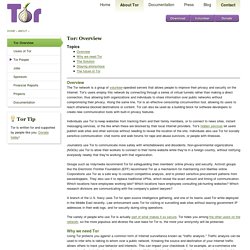
Tor's users employ this network by connecting through a series of virtual tunnels rather than making a direct connection, thus allowing both organizations and individuals to share information over public networks without compromising their privacy. Along the same line, Tor is an effective censorship circumvention tool, allowing its users to reach otherwise blocked destinations or content. Tor can also be used as a building block for software developers to create new communication tools with built-in privacy features. Individuals use Tor to keep websites from tracking them and their family members, or to connect to news sites, instant messaging services, or the like when these are blocked by their local Internet providers. Journalists use Tor to communicate more safely with whistleblowers and dissidents.
A branch of the U.S. Human Rights Video, Privacy and Visual Anonymity in the Facebook Age. This is a guest blog entry by Sam Gregory, Program Director for WITNESS.
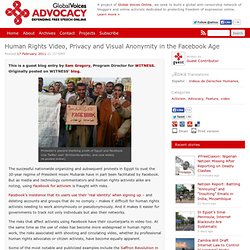
Originally posted on WITNESS’ blog. Protester's placard thanking youth of Egypt and Facebook (via Twitter user @richardengelnbc, and now widely re-posted online) The successful nationwide organizing and subsequent protests in Egypt to oust the 30-year regime of President Hosni Mubarak have in part been facilitated by Facebook. Frog design: Whose Data Is It? The question of who owns personal data just doesn’t seem to go away.
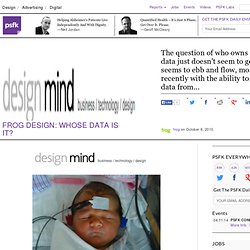
It seems to ebb and flow, most recently with the ability to collect data from devices within a Personal Area Network (PAN) or Wireless PAN (WPAN). A recent experience of mine brought this issue up to the forefront again. However, first the back story. I’ve been a long-term competitive runner since high-school and heart-rate has always been an important part of my training. When I coached High-School Track and Field from 2001-2003 I bought a Suunto sports watch to record time, heart-rate and altitude during my workouts so when I ran with the athletes, I could better monitor our stress levels. Cycle ahead (pun intended) to the 2010 Tour de France and I was blown-away by how the HTC-Columbia team was sharing their personal data. So now we come to my “beef”, the issue of which is the title picture. According to the California state Provider Manual published by the Department of Health Care Services [see It states that: No such thing as a private source of information.
Karl Popper, author of Wolff's favourite footnote.
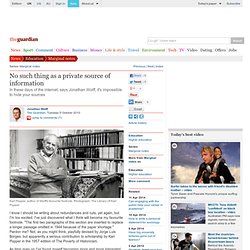
Photograph: The Library Of Karl Popper I know I should be writing about redundancies and cuts, yet again, but I'm too excited. Have Cell Phones Become Personal Tracking Devices? - TIME - NewsTrust.net. Smart phones do many things these days: surf the Internet, send e-mail, take photos and video (and — oh, yes — send and receive calls).
But one thing they can do that phone companies don't advertise is spy on you. As long as you don't leave home without your phone, that handy gadget keeps a record of everywhere you go — a record the government can then get from your telephone company. The law is unclear about how easy it should be for the government to get its hands on this locational data — which can reveal whether you've been going to church, attending a Tea Party rally, spending the night at a date's house or visiting a cancer-treatment center. A federal appeals court ruled last week that in some cases the government may need a search warrant. What They Know. Tor: anonymity online. The Mobile City » Blog Archive » Mobile phones, social networks and location data: Recognizing the Nuances of Privacy. This weekend the new issue of OPEN will be launched at the Berlin Biennial.
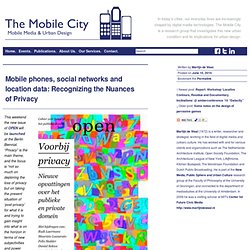
Check-Ins, Geo-Fences, And The Future Of Privacy. Facebook is under a lot of heat right now for how it shares our personal information.
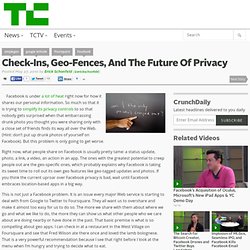
So much so that it is trying to simplify its privacy controls to so that nobody gets surprised when that embarrassing drunk photo you thought you were sharing only with a close set of friends finds its way all over the Web. (Hint: don’t put up drunk photos of yourself on Facebook). But this problem is only going to get worse. Right now, what people share on Facebook is usually pretty tame: a status update, photo, a link, a video, an action in an app. The ones with the greatest potential to creep people out are the geo-specific ones, which probably explains why Facebook is taking its sweet time to roll out its own geo features like geo-tagged updates and photos. This is not just a Facebook problem. Web Privacy: In Praise of Oversharing.